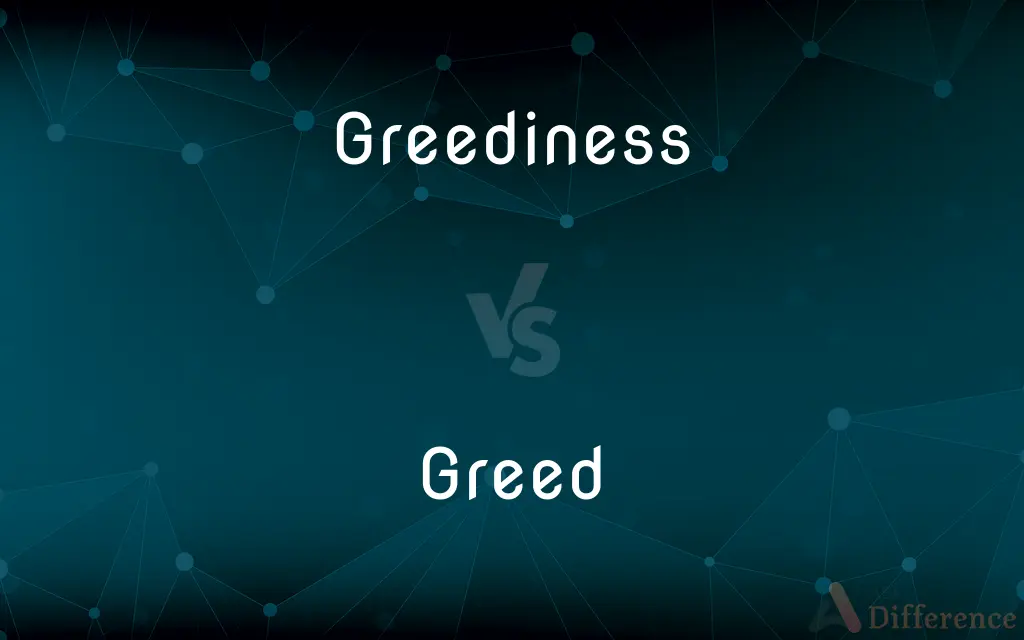Greediness vs. Greed — What's the Difference?
By Tayyaba Rehman & Urooj Arif — Updated on April 20, 2024
Greed refers to an excessive desire for wealth or possessions, while greediness emphasizes the intense, selfish pursuit of these desires.

Difference Between Greediness and Greed
Table of Contents
ADVERTISEMENT
Key Differences
Greed is a broad term that denotes a strong and excessive desire for more wealth or resources than one needs. Greediness, on the other hand, connotes a more aggressive and selfish form of this desire, often implying a disregard for others.
In common usage, greed can describe both a personal characteristic and a motivational state that affects behavior and decision-making. Greediness specifically highlights the behavior, suggesting an overt and often unattractive manifestation of greed.
Philosophically, greed is considered a vice that can lead to personal and societal harm, suggesting a moral failing. Greediness further intensifies this negative moral judgment, portraying a deeper level of ethical degradation.
In literature and media, characters described as greedy are often central to themes of corruption and downfall. Characters characterized by greediness are typically portrayed more intensely, their actions driving crucial plot developments.
Economically, both terms can explain behaviors that prioritize personal gain over collective well-being. However, greediness is used to emphasize particularly ruthless or exploitative strategies.
ADVERTISEMENT
Comparison Chart
Definition
Excessive desire for wealth
Intense, selfish pursuit of wealth
Implication in behavior
May not always be visible
Overt and clearly observable
Moral Judgment
Generally negative
Strongly negative
Usage in Literature
Often a theme or trait
Drives plot with intense actions
Economic Impact
Can lead to unethical choices
Associated with ruthless tactics
Compare with Definitions
Greediness
A powerful motivator in economic contexts.
Market dynamics are frequently influenced by corporate greed.
Greed
Criticized in both personal and social contexts.
Greediness is frowned upon in most cultures.
Greediness
An intense longing for material gain.
His greed for success made him neglect his family.
Greed
A heightened form of greed with visible effects.
The businessman's greediness was evident in his business dealings.
Greediness
A thematic element in storytelling.
The novel’s protagonist battles his own greed.
Greed
Often manifests in selfish behavior.
Greediness led her to hoard resources others needed.
Greediness
A factor in societal inequality.
Societal issues stem from the greed of a few at the expense of many.
Greed
An unattractive, intense desire for more than one needs.
His greediness at the buffet was embarrassing.
Greediness
A vice that overshadows ethical considerations.
Greed often blinds people to the repercussions of their actions.
Greed
Directly impacts relationships negatively.
His greediness caused his friends to distance themselves.
Greediness
Having or showing a strong or excessive desire to acquire money or possess things, especially wishing to possess more than what one needs or deserves.
Greed
Greed (or avarice) is an uncontrolled longing for increase in the acquisition or use of material gain (be it food, money, land, or animate/inanimate possessions); or social value, such as status, or power. Greed has been identified as undesirable throughout known human history because it creates behavior-conflict between personal and social goals.
Greediness
Having or showing a desire to eat or drink in large or excessive amounts.
Greed
Intense and selfish desire for something, especially wealth, power, or food
The colonists' greed for African land
Mercenaries who had allowed greed to overtake their principles
Greed has taken over football
Greediness
Extremely eager or desirous for an activity or pursuit
Greedy for the opportunity to prove their ability.
Greed
An excessive desire to acquire or possess more than what one needs or deserves, especially with respect to material wealth
"Many ... attach to competition the stigma of selfish greed" (Henry Fawcett).
Greediness
The state of being greedy; greed.
Greed
A selfish or excessive desire for more than is needed or deserved, especially of money, wealth, food, or other possessions.
His greed was his undoing.
Greediness
The quality of being greedy; vehement and selfish desire.
Fox in stealth, wolf in greediness.
Greed
To desire in a greedy manner, or to act on such a desire.
Greediness
An excessive desire for food
Greed
An eager desire or longing; greediness; as, a greed of gain.
Greediness
An excessive desire for wealth (usually in large amounts);
The greediness of lawyers
Greed
Excessive desire to acquire or possess more (especially more material wealth) than one needs or deserves
Common Curiosities
Are there any psychological theories that explain greed or greediness?
Psychological theories such as behavioral economics and Freudian psychology offer explanations for greed and greediness, focusing on desire, reward, and ego.
Can greed and greediness be measured or quantified?
While difficult to quantify precisely, psychological assessments and economic indicators can provide insights into behaviors driven by greed or greediness.
Is greediness just a more intense form of greed?
Yes, greediness is generally considered a more intense and visibly selfish form of greed.
How do greed and greediness manifest in professional settings?
In professional settings, greed can manifest as cutthroat competition and unethical business practices, whereas greediness might appear as exploiting coworkers or resources for personal gain.
How do religions typically view greed and greediness?
Most religions condemn both greed and greediness, viewing them as roots of evil and moral decay.
What role do greed and greediness play in capitalism?
In capitalism, greed is often seen as a driving force for innovation and efficiency, while greediness is viewed critically as it can lead to market failures and inequality.
How can individuals combat their own greed or greediness?
Individuals can combat greed and greediness through self-reflection, ethical education, and cultivating empathy and generosity.
What are common synonyms for greed and greediness?
Common synonyms for greed include avarice and covetousness, while greediness is often synonymous with gluttony and rapacity.
Are there positive aspects of greed?
Some argue that greed can motivate individuals to achieve high levels of success and efficiency, contributing positively to economic development.
What literary works famously explore the themes of greed and greediness?
Works like Charles Dickens’ "A Christmas Carol" and F. Scott Fitzgerald’s "The Great Gatsby" explore the themes of greed and greediness.
Is there a genetic or biological basis for greed or greediness?
Some research suggests that there may be genetic factors influencing traits like risk-taking and reward-seeking, which can relate to behaviors of greed or greediness.
What historical events have been influenced by greed or greediness?
Historical events like the 1929 Stock Market Crash and the 2008 Financial Crisis have been significantly influenced by greed and greediness.
Can education influence one's level of greed or greediness?
Education that fosters ethical values and empathy can potentially reduce tendencies towards greed and greediness.
Can societal values influence the prevalence of greed and greediness?
Yes, societal values that emphasize material success and individualism can foster higher levels of greed and greediness.
How do greed and greediness affect mental health?
Greed and greediness can lead to stress, anxiety, and dissatisfaction, negatively impacting an individual's mental health.
Share Your Discovery

Previous Comparison
Expectation vs. Requirement
Next Comparison
Footprint vs. FingerprintAuthor Spotlight
Written by
Tayyaba RehmanTayyaba Rehman is a distinguished writer, currently serving as a primary contributor to askdifference.com. As a researcher in semantics and etymology, Tayyaba's passion for the complexity of languages and their distinctions has found a perfect home on the platform. Tayyaba delves into the intricacies of language, distinguishing between commonly confused words and phrases, thereby providing clarity for readers worldwide.
Co-written by
Urooj ArifUrooj is a skilled content writer at Ask Difference, known for her exceptional ability to simplify complex topics into engaging and informative content. With a passion for research and a flair for clear, concise writing, she consistently delivers articles that resonate with our diverse audience.
















































